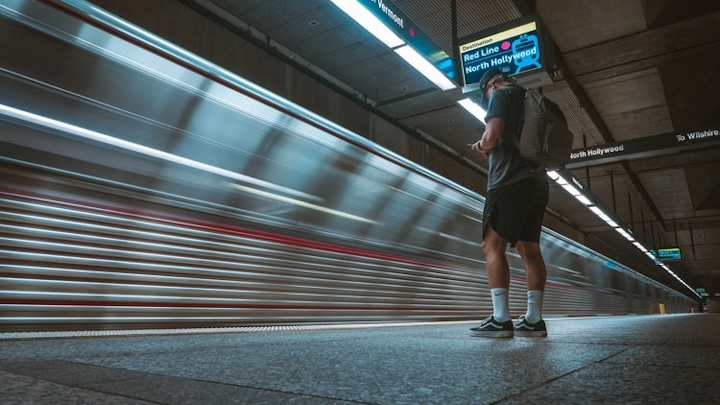
MTI researchers found more attacks happened on transit systems during off-peak hours, but peak hours attacks were more lethal.
Blake Lee/Unsplash
A new report from the Mineta Transportation Institute (MTI) has found attacks on transit passengers are more likely to occur during off-peak hours. However, those that occur during peak hours are more lethal.
The report, Frequency and Lethality of Attacks on Surface Transportation Systems of Developed Countries, by Time of Day, analyzed 504 attacks on passenger rail and bus systems in developed countries between 1970 and 2020. The report’s authors, MTI Research Associates Brian Michael Jenkins and Bruce R. Butterworth, identified two categories of peak hours—average workday rush hours (6 a.m. – 10 a.m. and 5 p.m. – 8 p.m.) and holidays with high traffic and tourist travel—to determine how time of day of attacks affects lethality.
Jenkins and Butterworth found 63 percent of attacks occurred during off-peak hours, 19 percent occurred during peak hours and the timing of the remaining 19 percent is unknown. The researchers note by isolating the 168 weekday attacks for which specific time is known, proportions shift to where 45 percent of attacks occur during peak periods and 55 percent occur during off-peak periods.
 Figure 1: Weekday Fatalities, by time Block, with the four outlier attacks includedMineta Transportation InstituteThe report also says peak hour attacks are 4.5 times more lethal. Jenkins and Butterworth recognize large scale incidents, such as the 1995 Tokyo Sarin attack, the 2003 arson on a subway in Daegu, South Korea, the 2004 bombing of a commuter train in Madrid, Spain, and the 2005 London transport bombings, had the potential to skew the numbers. The initial analysis did not include these four events, but when added in the lethality. increases to more than five times that of off-peak attacks.
Figure 1: Weekday Fatalities, by time Block, with the four outlier attacks includedMineta Transportation InstituteThe report also says peak hour attacks are 4.5 times more lethal. Jenkins and Butterworth recognize large scale incidents, such as the 1995 Tokyo Sarin attack, the 2003 arson on a subway in Daegu, South Korea, the 2004 bombing of a commuter train in Madrid, Spain, and the 2005 London transport bombings, had the potential to skew the numbers. The initial analysis did not include these four events, but when added in the lethality. increases to more than five times that of off-peak attacks.
“The morning rush hour may be the most lethal time of attacks on surface transportation because it offers a large number of potential victims, important particularly when bombs are used,” Jenkins and Butterworth wrote in a report summary. “Moreover, attackers may be able to avoid detection in morning crowds, and the night and early morning hours offer a long period when last-minute operations can be readied under minimal surveillance.”
 Figure 2: Lethality (deaths per attack) during weekday time blocksMineta Transportation InstituteJenkins and Butterworth also note two points that the research shows; first, the pattern of attacks on train targets is quite different from that of attacks on bus targets, with far more bus attacks occurring during non-peak hours. Second, the United Kingdom has the highest frequency of attacks (19 percent of the total), followed by Spain (16 percent) and then the United States (11 percent).
Figure 2: Lethality (deaths per attack) during weekday time blocksMineta Transportation InstituteJenkins and Butterworth also note two points that the research shows; first, the pattern of attacks on train targets is quite different from that of attacks on bus targets, with far more bus attacks occurring during non-peak hours. Second, the United Kingdom has the highest frequency of attacks (19 percent of the total), followed by Spain (16 percent) and then the United States (11 percent).
“Most U.S. attacks are carried out by mentally unstable individuals with no discernible pattern. There is a need for far more proactive alerts and treatments for these individuals rather than punishment,” said Butterworth.
The researchers also note 14 of the attacks in the U.S. were armed assaults; explosives were used in 11 attacks and eight involved stabbings, representing more than 60 percent of all U.S. attacks.
“While not a wave of terrorism, U.S. anti-social violence is a disturbing trend that authorities must contend with while keeping an eye on terrorists,” said Jenkins.
Jenkins and Butterworth believe the forensic detail provided by their research, along with the quantification and analysis of the data associated with attacks on public transport during rush hours, can help anyone involved improve safety and security planning and potentially save lives.
“Ultimately, these findings can help establish timelines and attack patterns, which can be used for security and planning and aid those responsible for running and overseeing transit operations to prioritize visible and remote security presence and quick response to attacks on transit systems,” MTI concluded.
The full report can be downloaded at MTI's website.
"occur" - Google News
June 03, 2021 at 08:49PM
https://ift.tt/2SNR2uR
MTI researchers find most transit system attacks occur during off-peak hours - MassTransitMag.com
"occur" - Google News
https://ift.tt/2UoDqVw
https://ift.tt/2Wq6qvt
Bagikan Berita Ini















0 Response to "MTI researchers find most transit system attacks occur during off-peak hours - MassTransitMag.com"
Post a Comment